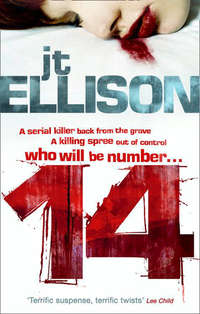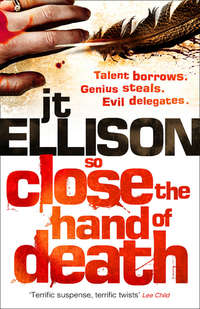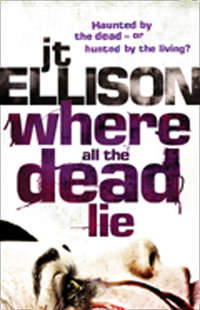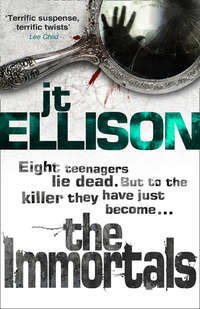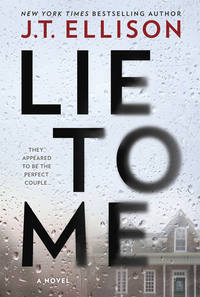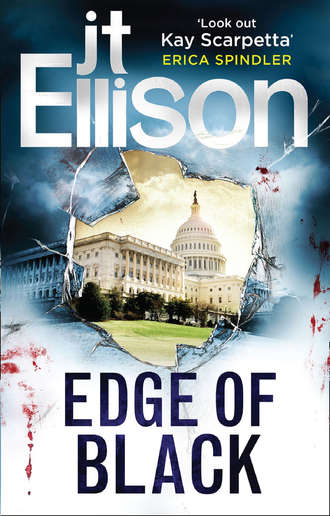
Полная версия
Edge of Black
“Put these on.”
They both slipped into the masks, eyes wide with fear.
“What’s happening, Dr. Owens?”
Long low beeps began, different tones and beats. All of the phones in the room were chiming, including hers. She reached for it, but Reggie beat her. He turned his phone in her direction so she could read the text. It was from Alert DC.
Washington D.C. Metro System is temporarily closed. Tune to your local emergency channels for updates.
Sam felt a massive ripple of unease.
Reggie got another text. “It’s up on GW Alert, too. What do you think’s happening, Dr. Owens?”
“I don’t know. You know how emergency services can be, though. They tend to overreact.”
They both knew she was lying.
Sam wanted to comfort them. Reggie was handling himself, but Elizabeth looked like she was about to fall apart. “Okay, kids. Hopefully this is just a false alarm, a mistake, even a drill. We do need to get in touch with Brooke’s parents. Reggie, can you call the chancellor’s office and let them know what’s happening? Elizabeth, how about you get in touch with your RA. Let’s see if we can approach from two sides.”
Reggie received another text. Then another. With every new ding Sam’s heart beat harder.
“It’s official. They’re sending people with symptoms here, to GW.”
Reggie finally started to look worried.
“Why?” Elizabeth asked.
Sam met her eyes. “Because they have the largest mass decontamination unit in D.C.”
Decontamination. That was not the word she wanted to speak right now. Decontamination implied a biological or chemical attack. Which meant only one thing.
Terrorism.
Reggie nodded. “It gets worse. It’s happening right below us.”
“Below us?”
He looked at her in horror. “They think it started at the Foggy Bottom Metro.”
Chapter 3
Foggy Bottom was the Metro stop that fed George Washington University, as well as Georgetown. It was the last D.C. stop on the Blue Line west before it slipped under the Potomac and headed into Virginia. Just a stone’s throw away from the Watergate and the Kennedy Center, six blocks from the White House, it was one of the deepest Metro stops in the system, with an escalator that defied gravity and was constantly under repair. You could cut half an hour off your gym workout if you climbed those stairs.
Sam’s mind was a blur, but she processed the information quickly. She had training for these types of situations—in the post 9/11 world, all law enforcement in Nashville had been given extensive briefings and training sessions, and as head of the medical examiner’s office, she’d been a part of that. Her first inclination was to figure out how to help.
“Stay here,” she said to Reggie and Elizabeth.
“Where are you going?”
“To see what I can do to help.”
“Dr. Owens, it’s not safe.”
She turned back to Reggie and Elizabeth. “I’ll be very careful. I promise. You follow the instructions you’re given by the doctors and nurses here.”
She booked it to the exit. The scene had changed dramatically in the fifteen minutes they’d been inside the hospital. Blue and white lights flashed, and she could hear shouting. The street was littered with fire engines, HAZMAT trucks, cops, ambulances and first responders rushing purposefully toward the Metro. Crime scene tape had already gone up around the park and the roads were closed, traffic being diverted away from the scene. Techs in Tyvek suits with SCBA—self-contained breathing apparatuses—streamed down the frozen escalator. A uniform shouted at Sam, gesticulating wildly toward the medical center. The message was clear. Get the hell out of the way.
The only comfort Sam took from the scene was that it was still intact. A suitcase bomb would have eliminated the area.
So not nuclear. Biological or chemical. It could be anything, really. Her mind started into overdrive, and she could swear she was starting to itch. She hoped it was a psychosomatic response.
A first receiver, bundled in Tyvek and nearly unrecognizable as a male aside from his size, stopped her. People dressed similarly were streaming past them into the bowels of the Metro.
“Ma’am, were you in the Metro?”
“No. What’s happening? I’m a doctor, with disaster training. Can I help?”
“Not until we can be sure you’re okay. Get inside the hospital. You’ll be decontaminated and asked to stay for observation.”
“I just came from the hospital. I’m fine. I want to help.”
The receiver shook his head and pointed toward the doors. “Too bad. You’ve exposed yourself. You have to go though the process. Get inside.”
Oh, son of a bitch. She shouldn’t have gone back out until the scene had cleared. Now she was going to be stuck.
Sam was tempted to disregard him, to surge forward, but the thought was fleeting. She’d just be in the way.
She turned and went back into the hospital. A line was forming on the right side of the emergency room, snaking down the hall. Sam knew immediately what they were doing: triage for the people who were in the Metro, and triage for those who weren’t. So whatever substance this was, they were taking precautionary measures for the people who were close to the attack, and a whole different set for those actually exposed to the contaminant.
Another receiver met her, this time a no-nonsense nurse with steel-gray hair and a sharp chin. Sam tried again. “I’m a doctor. What are we dealing with? What kind of toxin?”
The woman shook her head. “We don’t know anything just yet, sugar. Now shut up and get in line, you’re holding things up.”
Nurses. The same everywhere. All dedicated to helping, and no time for bullshit.
Maybe this was just a massive false alarm. She prayed fervently that was the case, but the precautions now being taken—those that she could see, anyway—precluded that.
Sam was passed from hand to hand, interviewed briefly, and when it was clear she hadn’t been in the Metro proper, nor was exhibiting any symptoms, was sent to yet another line. People formed in behind her, more excited than scared.
What the hell was going on? Sam wasn’t used to being incapacitated like this. She felt just fine. Obviously the exposure was in the Metro. She could see people coming in on stretchers, their clothes rapidly being cut off and disposed of, oxygen applied. One man was intubated, the rest were just moaning. Sam watched the first receivers bathe his body with a solution of soapy water, getting whatever he had been exposed to off his skin.
Words were starting to float around now, from the people coming in off the street.
Respiratory distress. Coughing. Burning eyes. White powder.
Sam’s trained mind went to a different place.
Anthrax. Ricin. Sarin.
D.C. was always on extra high alert, just like New York, and all the major cities, really, for any hint of terrorist activity. There was one plus to the situation—they were prepared for nearly anything. But the fallout from any of those kinds of attacks could last for days. She combed her memory—what was today? An anniversary of some sort, with meaning only to those involved?
Her line, the double-check line, she’d dubbed it, took only ten minutes, but it felt like hours. Sam was finally in front of Dr. Evans again.
“Name?”
“Dr. Samantha Owens. We met an hour ago.”
He was taken aback for a moment, then nodded. “I remember. Nashville. What are you doing here?”
“I went outside to see if I could help.”
“Brilliant, Doctor. We’ll need you on the back end of this, not in the middle. Any new symptoms?”
“No. I’m fine.”
“Since you’ve been in the contamination zone you have to stay isolated for the time being. Maybe you could keep an eye on the folks here, let us know if any of them start showing symptoms. The reports are coming in that the people who are sick took the Metro this morning. So we’re just being extra cautious with people who were in the area. Can you do that for me? Keep yourself out of any more trouble?”
“Of course. But what should I be looking for outside of respiratory distress? What are we dealing with?”
“We don’t know yet. They’re in the tunnels doing air-quality tests. HAZMAT is getting positives for an unidentified neurotoxin. Might be a false alarm, but I’ve seen too many people who aren’t looking good to think it’s just a mistake. Good news is, while we’ve got a few critical, none are dead yet. Hang in there. It’s going to be a while before we can release you.”
“I have HAZMAT training. I can help.”
“We’re fine right now. We’re the best in the country at response. Thanks, though.”
She was shuffled off to the right again, taken down a long hallway, then asked to sit on the floor and wait.
This was insane. She should be helping, not sitting in a hallway with a bunch of scared people waiting to see if any of them started coughing.
They couldn’t stop her from thinking about the situation, though. She knew exactly what the HAZMAT teams were doing, the tests they’d be running. If there was powder, they’d be able to analyze it on-site. If it was airborne, that was a whole different kind of response.
The logic of the situation started to eat at her. If Foggy Bottom was ground zero, why stage a biological or chemical attack at the Metro station closest to the best decontamination unit in the area? Remorse? Desire to allow innocents to live? Terrorists wouldn’t be kind, or allow for convenience. They’d stage as far away from help as they could to maximize the dead, then hit the first responders as they came in, as well.
Come on, Sam. You are really jumping to conclusions now. You don’t even know what’s happening—it could just as easily be a chemical fire as it could a terrorist attack. The Metro was constantly under repair, and steady work was being made on the new Silver Line to the airport. This was most likely just a local issue that needed extra precautions.
That made her feel better. It wasn’t like her to assume: she was a scientist, after all, logic and evidence her closest friends. But it felt different to be involved, not on the outside trying to figure out what was happening. Without a cadaver, a set of sharpened Henckel knives and a dissection tray, she was sometimes lost.
But she’d been involved in plenty of investigations in the past. She couldn’t help herself. She let her thoughts distract her. How many victims would there be? If it was a biological or chemical hazard, it could take hours until they knew what they were dealing with. If it was airborne, it could be ten times worse. So many of the airborne toxins took hours to manifest symptoms, and were practically impossible to contain. With this many people already down, perhaps it was something else. Chemical, most likely.
It was rather cruel and unusual punishment that there wasn’t a TV in the hallway they could tune to. She figured the media was going absolutely stark raving mad by now.
Her iPad was first generation wireless only, damn it, or else she could be researching exactly what was going on right now. Her phone was just that, a phone, with the ability to dial in and out, and receive texts. She wished she could text Reggie, let him and Elizabeth know she was stuck back here, but she didn’t have his number in her phone.
She wished she could call Xander. But he was fishing today, off in the wilderness. She’d never be able to reach him. One of the things that they were both happy about in the relationship was the freedom. Sam wasn’t a hoverer, and Xander needed his space. He liked being able to come and go without letting her know his every move, and so did Sam. It was becoming the bedrock of their relationship. But right now, all Sam wanted was to hear his voice, to know that he was okay. To feel his arms around her.
The people near her started talking among themselves, and she listened to the rumors fly.
“It’s all over Twitter. They don’t know what’s going on but they’re saying fifteen dead.”
“I just heard two dead.”
“Twenty-nine bodies.”
“No one knows what the deal is.”
“Holy shit. They’re ordering extra body bags.”
Sam felt the blow to her gut. Any casualty would be too many. Two, fifteen, twenty-nine—she hoped to God those numbers weren’t just climbing as more cases were reported. If that number was even close to the truth...and with many airborne toxins, instant death was rare. Obviously people had made it out of the Metro; the triage nurse wouldn’t have asked her if they hadn’t.
Jesus. She just wanted to know what they were dealing with.
Fletcher.
Ah. Why hadn’t she thought of it before? Detective Darren Fletcher, her buddy in D.C. homicide. He’d tell her what was going on, if he knew, at least.
She went through her phone until she found his cell number. She hadn’t talked to him since she got back to town and started teaching, irrationally hoping he wouldn’t be upset with her. She’d worked a case with him before she moved back to D.C., the death of her ex-boyfriend, and the two of them had formed a bond. Fletcher would have liked that bond to go further, but he’d respected the fact that she was with Xander now. Sort of. She hadn’t been willing to test that theory yet.
The phone rang and rang and rang, finally going to voice mail. Well, that wasn’t good. That meant he was either avoiding her call or too busy to take it. She decided to try one more contact—Dr. Amado Nocek, one of the city’s medical examiners. Nocek had offered her a position with the M.E.’s office when she told him she wanted to move to D.C. She appreciated that offer so much, but being an M.E. wasn’t what she needed to be doing right now. She was still recovering, still trying to make sense of her life. Her job in Nashville had become an albatross around her neck instead of a joy. She needed to do something that didn’t involve day-to-day contact with the dead.
That’s why teaching appealed to her. She could talk about her field in a theoretical way, and not be hands-on again until she was ready.
Nocek answered on the first ring. His strangely lilting voice, the result of a European upbringing that drew on both Italian and French, combined with several years in the polyglot accent that made up D.C., calmed her immediately. “Samantha. It is very fine to hear from you this morning. I suppose you are calling to ask the nature of the emergency we find ourselves in, and not developing plans for a small, intimate gathering for dinner at your new house?”
Nocek always did have a way of cutting to the chase.
“You know me too well, Amado. I’m actually sitting outside the decontamination unit at GW. No one’s been forthcoming with information.”
“I will give you what I myself know. We have been getting reports of a biological contaminant that was released in the Metro. Multiple reports of people being taken ill, all over the city.”
“Any idea what the contaminant is?”
“No. People are presenting with respiratory distress, fever and coughing. It could be most anything.”
“Casualties?”
“None that are related to this that we are aware of yet, but that will most likely change as the day wears on. We are in an uncertain time at the moment, Samantha. I am well pleased to hear that you are safe.”
A stern-looking nurse tapped Sam on the shoulder. “Ma’am. Please turn off your cell phone.”
“And you, Amado. I’m sorry, but I’m going to have to go. Will you call me if you can once you find out more?”
“Of course. Be well, my dear.”
Sam hung up the phone. The nurse nodded at her, satisfied that the breach was under control, and strode away.
There was a young man sitting next to her. He raised an eyebrow and said, “Well?”
“Nothing concrete,” Sam said. She wasn’t about to tell a stranger what Nocek had just disclosed. That was just enough information to cause a wild panic.
“Are they going to let us out of here?”
“I hope so. My friend said there have been no confirmed casualties. So that’s good news. This may be a false alarm after all. Sometimes in an emergency situation, people who are already sick have issues.”
She turned away from him and stared at the floor.
This wasn’t how her new life was supposed to begin.
Is it possible to ever really start over? To find yourself after a tragedy? How do you measure the pain you’ve experienced, and know what is appropriate and what isn’t? Sam had lost her husband and her twins in the Nashville floods two and a half years ago. And lost part of herself, too. She’d come to D.C. the shell of a person, one going through the motions of a daily life, a breathing ghost. More loss had led her to Xander, and her path back to the land of the living.
She had to admit she felt a little snake-bit. Nashville, and her life there, had been decimated. She’d run to D.C., and now it, too, was under attack.
She could only hope that the damage would be minimal. To all of them.
Chapter 4
Another hour passed. Sam was just about to start stamping her feet and demanding answers when the nurse who’d run the initial triage came down the hall.
“Is everyone feeling all right?”
There was a chorus of affirmations.
“You’ve been cleared to leave. Please come back immediately if you have any unusual symptoms. Use your masks until you get home.”
Sam couldn’t wait to get out of there. If she’d been stuck much longer, fretting and worrying, she might not be able to control her anxiety. And losing it in a group of strangers wasn’t exactly her cup of tea.
They broke off into packs and left the hospital through the emergency room doors. A corridor had been created for their exit, and they were able to leave unmolested. Sam tried to look for the kids but didn’t see them. Hopefully, they’d been released much earlier.
The scene had calmed considerably since her preliminary foray outside. The bright summer sun beat down on the asphalt, making waves of heat shimmer in the foreground. News trucks had replaced the first responders, though there were still a few HAZMAT trucks parked at the curb.
Sam turned her phone on the second she was clear of the doors. She had two messages—both from Fletcher.
She played them in order.
“Saw you called, I assume you’re wondering about what’s going down. Call me back when you get this.”
The second was more abrupt. “Where the hell are you, Owens?”
Ah, that was sweet. He was actually worried about her. Fletcher was a good man. A good man, but not her type. They were destined for friendship only.
Sam hiked up to 23rd Street, found a bench and called Fletcher back. He answered on the first ring, obviously annoyed.
“Where have you been?”
“At the hospital, Mom. One of my students got extremely ill and I took her to GW, then got caught in the decontamination fuss. I’ve been sitting in a hallway for two hours. They made me turn off my phone.”
“Are you okay?”
“I’m fine. What’s going on? I talked to Amado and he told me—” she glanced around then covered her mouth with her hand “—it’s a biological attack.”
“We don’t know yet. Total clusterfuck. People sick from all corners of town, we can’t trace it down, and the entire city is on alert. Homeland Security raised the threat level. They are in a dither.”
“That’s to be expected. What can I do to help?”
“Nothing.” Fletcher sounded horrified at the idea, which hurt Sam’s feelings a little.
“I can’t just sit here, Fletch.”
“You most certainly can. Better yet, get home and stay there. I have to go, but I’ll call you later. Don’t interfere, Sam. Just let us do our jobs. It’s our town, we know how to handle things.”
He hung up, and she felt stung all over again. Dismissed like a civilian. It was her town now, too.
She stowed the phone in her pocket and started the walk home. It would only take fifteen minutes or so on a normal day, but the sidewalks were crowded with people, and the traffic was a snarled nightmare.
As pissed and upset as she was, she reminded herself again that she was no longer involved in the day-to-day operations of law enforcement. And that had been her choice. A choice that until this very moment she thought she was content with. Instead, here she was, a victim again. Caught in an attack, unable to do anything to alter her course. She started itching for some hot water, satisfied the urge with a dollop of antibacterial gel.
At Washington Circle she turned left on Pennsylvania Avenue and followed the throngs of people trying to get out of the city on foot. She’d worn sandals today, thank goodness. Hiking all the way home in heels would have been brutal. It was bright and sunny, warm, but without the summer humidity that usually choked D.C.’s air from May until September. All around her people were talking, worrying, panicking, preening, many on cell phones relaying their close call with...something. They didn’t know for sure what. A fever of excitement and nervousness permeated the crowds, overlaid with an overwhelming sense of fear.
Fear of the unknown. Of what could be happening. Of getting home and finding out that someone you know, someone you love, was involved. Was hurt. Or worse.
Sam remembered that awful feeling from 9/11, the hours of uncertainty, the unanswered phone calls, the nightmarish quality of the news reports, almost as if Hollywood had decided to drop a CGI green screen against the Manhattan and D.C. backdrops and shoot a heart-wrenching action sequence. She’d lost several friends that day: two who were in the towers when they fell, one on the plane that crashed into the Pentagon.
Even one casualty was too much.
When she arrived at her house on N Street, it was just after 2:00 p.m. Four hours had passed since Brooke’s swan dive in class. Four interminably long hours. She was exhausted. She just wanted to take a long, hot shower, and wait for Xander to get back within cell range.
Sam took the steps to her front door, inserted her key. The door was unlocked.
She thought back, trying to remember if she’d locked it this morning when she left for class. Of course she had. She always locked her doors.
She heard her best friend’s voice mentally admonish, “Back out, and call the police.”
Sam shook homicide lieutenant Taylor Jackson out of her head. There was a perfectly legitimate reason for her front door to be open. The only problem was the timing. She turned the knob and pushed the door open with her foot.
“Xander?” she called out.
“Sam!” Xander came barreling out of the kitchen. She was struck by how handsome he was, even with worry lines creasing his forehead. His dark eyes locked on hers. He reached her in two long strides and pulled her to his chest.
“Jesus, I’ve been worried sick. You weren’t answering your phone.”
She let him hold her, just reveling in the normalcy of it, how warm his skin was beneath his T-shirt, how she could just reach all the way across his tightly muscled back, his scent, woodsy and clean. He’d showered recently; the edges of his dark hair were still damp.
She pulled back.
“What are you doing here?”
He didn’t answer, instead kissed her, long and soft, so sweetly that she nearly forgot everything that had happened this morning. Nearly everything.
When he released her, she smiled up at him. He topped her by several inches. He made her feel downright dainty.
“Trying again. Why are you here, Xander? Not that I’m not thrilled to see you, but I thought you were fishing.”
He draped an arm across her shoulders, walked her into the kitchen.
“There’s tea. It should still be warm. And I did go fishing. My guy never showed, and nothing was biting so I decided to head back to civilization and check my email. I heard about the attack and started down here immediately. I called as soon as I got here. Why didn’t you answer your phone?”
Sam reached into her pocket. She opened the phone and saw a blank screen. It must have run out of battery on her walk home.





